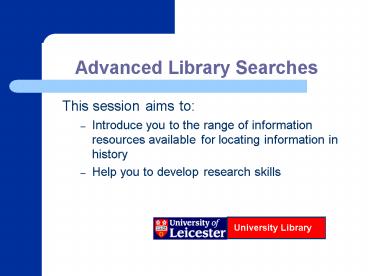Advanced Library Searches - PowerPoint PPT Presentation
1 / 26
Title:
Advanced Library Searches
Description:
Time period: Victorian period or 1800s or 19th century or nineteenth century. Victorian language & punishments ... Crime in Victorian London (Catalogue Book search) ... – PowerPoint PPT presentation
Number of Views:45
Avg rating:3.0/5.0
Title: Advanced Library Searches
1
Advanced Library Searches
- This session aims to
- Introduce you to the range of information
resources available for locating information in
history - Help you to develop research skills
University Library
2
Session Content
- Planning
- Advanced catalogue searching
- Finding journal articles
- Print resources
- Internet based indexes and abstracts (usually
referred to as databases) - Researching on the Internet
3
Planning
- What words or terms describe your topic?
- Are there other keywords that are relevant also?
- Are there differences in spelling or terminology?
- How do you combine keywords to get what you want?
- What limits do you apply?
- What sources (print and electronic) can you use?
4
Organising Terms to Describe Your Topic
- Keywords (free text)
- Subject headings (controlled language)
- Broader term
- Narrower term
- Victorian England
- England history 19th century
- Great Britain history
- Victorian Leicester
5
Subject headings
6
Combining Keywords
- Combine keywords to form a search strategy
- Topic
- Crime in London during the Victorian period
7
Sample topic
- Crime in London during the Victorian period
- Focus crime
- Keywords crime or criminals or criminology or
offenders or felons - Limits London or England or Great Britain
- Time period Victorian period or 1800s or 19th
century or nineteenth century
8
Victorian language punishments
- Jails, gaols, prisons, penitentiaries, houses of
correction, correctional institutions,
reformatory - Tread-mills, transportation, extradition, hard
labour, corporal punishment, chain gangs
9
Build up your search using
- Keywords
- Limits by place
- Limits by historical period
- Language appropriate to the period
- Indexing terms
- http//library.le.ac.uk/
10
Crime in Victorian London (Catalogue Book
search)
- Crim and (England or Britain or London) and
(19th century or nineteenth century) - There are many more keywords that could be used!
11
Advanced Catalogue Searching
- Advanced search option
- Searching tips
- Truncation (crim)
- Wildcard ? (wom?n)
- Phrase searching Black Death
- Searching by subject headings
12
Finding Journal Articles (Print)
- Articles are NOT found in the online library
catalogue - Use printed indexes of individual journals e.g.
Journal of Contemporary History index bound
in volume 21 - Review journals such as Economic History Review
- Use Historical Abstracts to find references
check the catalogue for the Journal TITLE - Use references given in books and articles
13
Economic history review e.g.
- Catalogue link
14
Databases for Journal Articles
- Go to Leicester Digital Library
- Subject Rooms
- http//www.le.ac.uk/library/
15
Database search tips
- Truncation
- Wildcard ? (or ) check Help screens
- Phrase searching
- Searching by Index terms
- Use the Help screens
16
Indexes and Abstracts
- Lists of references to articles from selected
journals arranged by author, subject and title - To find out which ones to use, look at
- Look under the heading of Printed Reference
Sources and Databases
Subject Rooms - History Subject Rooms - Economic
Social History
17
Researching on the WWW
- Evaluation
- Content
- Accuracy
- Currency
- Authority
- Reliability
18
Evaluating Information Information Sources
- Content
- Accuracy
- Currency
- Authority
- Reliability
19
Content
- Is the resource pitched at the right level?
- Is it too basic or too specific?
- Does it review information (secondary data) or
does it present research results (primary data)? - Does the resource cover the areas you are
interested in? - Is the information factual or an opinion?
20
Accuracy
- Are there a large number of errors in the
resource? - Does the resource state where its information
was obtained? - Does the information seem accurate when
cross-checked with other sources of information?
21
Currency
- When was the source published?
- When was the source updated?
- Does the resource rely on old pieces of
information or research?
22
Authority
- Who is the author?
- What are their academic/research credentials?
- What other works has the author published?
- Does the resource provide a bibliography or
sources for further information?
23
Reliability
- Is the resource published by a reputable company
or organisation? - Has the resource been subject to peer-review
and/or editorial processes? - Is the providing institution/author recognised as
an expert in your field? - Is the resource biased?
24
Google Scholar
- http//scholar.google.com/
- still in testing phase
- Retrieves journal articles
- Check library catalogue for full text
25
Summary (for electronic searching)
- Choose your keywords carefully
- Build up your search
- Evaluate what youre searching
- Evaluate what youre finding
- Allow plenty of time!
26
Library Help
- Ask at the Enquiry Desk, Ground Floor
- For more subject specific help, ask for Evelyn
Cornell, Information Librarian - ec37_at_le.ac.uk, or ext. 2055































